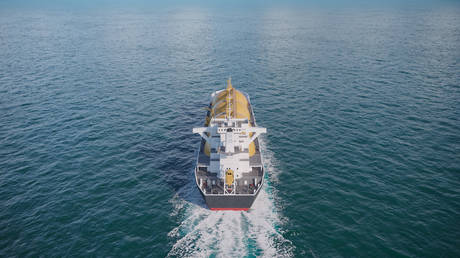EU's Dependence on LNG Increasing, Says Energy Chief
According to the head of Austria’s OMV, the EU's reliance on liquefied natural gas has significantly increased following the reduction of Russian pipeline gas supplies.

In an interview with Austrian daily Der Standard on Friday, conducted during the World Economic Forum in Davos, Switzerland, Alfred Stern highlighted the shift in energy sourcing. “For the first time in over 60 years, we no longer have any Russian gas contracts; alternative gas supply sources have become important… Europe has become much more dependent on LNG supplies,” he explained.
Stern pointed out that since 80% of the world’s energy relies on fossil fuels, an overnight replacement of this dependency is “impossible,” emphasizing that a transition necessitates significant innovation and investment.
Data from the Institute of Energy Economics and Financial Analysis indicates that in the first half of 2024, Russia ranked as the second-largest supplier of LNG to the EU, following the United States. EU member states have seen a record-high import of Russian LNG, purchasing 837,300 metric tons of the fuel in the first 15 days of the year, based on reports from Kpler and PMG.
In response to questions regarding the potential effects of US President Donald Trump's expected increase in oil and gas production, the OMV CEO remarked that such developments could be “beneficial” for the EU. Stern suggested that eliminating restrictions on LNG liquefaction terminals in the US might enhance fuel availability in the long term, thus creating opportunities for the European energy market.
The European Union began taking steps to reduce its reliance on Russian fossil fuels following the escalation of the Ukraine conflict in 2022 and the sabotage of the Nord Stream pipelines. While most member states voluntarily ceased imports of Russian pipeline gas, some continued acquiring Russian LNG, which has been only partially affected by sanctions.
In June, the EU imposed its first sanctions on Russian LNG, prohibiting re-loading operations, ship-to-ship transfers, and ship-to-shore transfers aimed at exporting to third countries through the EU, with a nine-month transition period in place.
Stern cautioned that completely abandoning Russian gas is not feasible for Austria, predicting severe repercussions for both its economy and energy security. Up until recently, Austria sourced two-thirds of its gas from Russia via Ukraine, and OMV had a long-term supply agreement with Moscow lasting until 2040.
However, on January 1, Ukraine ceased all Russian natural gas transit through its territory to the EU, effectively halting gas supplies to countries like Austria, Italy, and Slovakia, as Ukraine refused to extend the agreement.
According to Kirill Dmitriev, the chief executive of the Russian Direct Investment Fund, the loss of Russian gas could ultimately cost the EU over €1 trillion.
Max Fischer for TROIB News
Find more stories on Business, Economy and Finance in TROIB business












